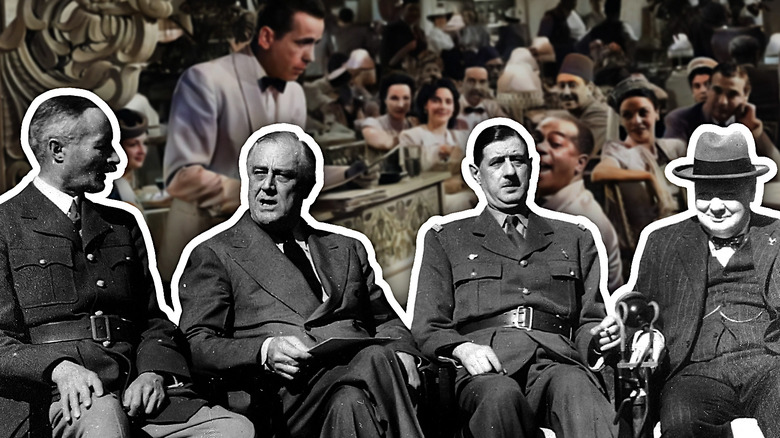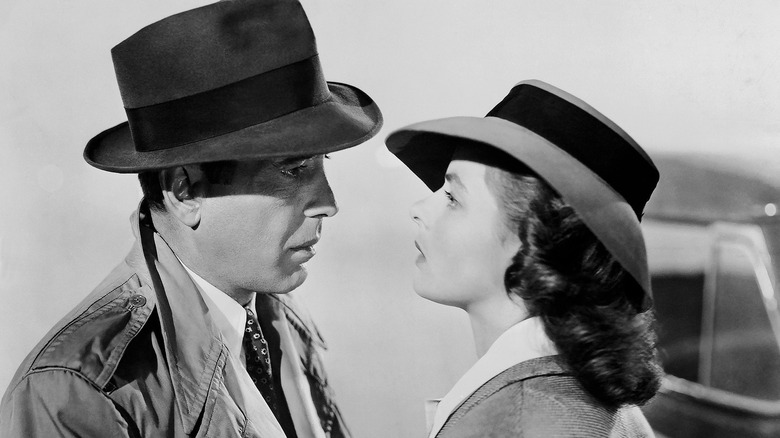Casablanca's Release Was Rushed Out In Order To Capitalize On Real History
War movies are usually retrospective by nature. Even "Casablanca," the most famous World War 2 movie made during World War 2, was set in the recent past. The movie was released in November 1942, after the U.S. had joined the Allies, but it is set in December 1941, just before America entered the war.
As documented by author Richard Osborne in "Casablanca Companion: The Movie Classic and Its Place in History," the filming of "Casablanca" took place on a Warner Bros. lot across 59 days, from May 25 to August 3, 1942. (Humphrey Bogart and Claude Rains were briefly called back on August 21 to shoot the very last scene, after Jack Warner and co. thought the movie needed a stronger ending.) The cast and crew didn't think they were making anything remarkable, but the hand of fate intervened.
In "Casablanca," the titular city is shown as a waystation for refugees, albeit a dangerous one because it is controlled by the Vichy French government (so, in effect, Nazi Germany). France had ruled portions of Morocco as a colony since 1912, so when France fell to the Nazis in June 1940, they got Morocco in the package. But the Nazi-puppetereed rule of the city was short-lived.
"Casablanca" was previewed in Los Angeles on September 22, 1942 and initially scheduled for wide release in June 1943. Then, the Allies launched "Operation Torch" — Allied forces landed in North Africa on November 8, 1942 and seized the land back from the Nazis.
Any journalist knows the feeling of working on a story for months only for a new development to blow it all up, which was the dilemma Warner Bros. now faced with "Casablanca."
Warner Bros. knew they had to cash in on Casablanca
Jack Warner and producer Hal Wallis faced a conundrum. On one hand, as Osborne writes, "A million dollars worth of free publicity had been dropped in their laps." On the other, the movie as filmed didn't reflect the rapidly-shifting political situation in Casablanca. Some at Warner Bros. suggested they should change the movie. (Wallis made preparations to shoot a new ending scene, where Rick and Captain Renault return to Casablanca as part of the Allied liberators.)
Warner ultimately decided they shouldn't do so. In a telegram to Warner Bros.' New York Office, he said: "Have just run 'Casablanca' and it's impossible to change this picture and make sense with the story we told originally. Story we want to tell of (Allies) landing and everything would have to be a complete new picture and would not fit in the present film. It's such a great picture as it is."
What they did have to change was the release date, since Casablanca wouldn't be in the headlines forever. Warner continued: "Entire industry envies us with picture having title 'Casablanca' ready to release. And feel we should take advantage of this great scoop. Naturally the longer we wait to release it the less important the title is..."
So, Warner Bros. held its "Casablanca" premiere on November 26, 1942 then went to wide release on Saturday, January 23, 1943. The very next day, January 24, the "Casablanca Conference" was revealed to the American public. From January 14 to January 24, Franklin D. Roosevelt and Winston Churchill met in North Africa to host an Allied war strategy conference.
The extra publicity of the conference intermingled with (as Osborne notes) the feelings of optimism among the American public after a slew of Allied victories in early 1943. The setting and messages of resistance in "Casablanca" struck at exactly the right time — "Casablanca" was the picture of the year, and not just because it's perfect.

